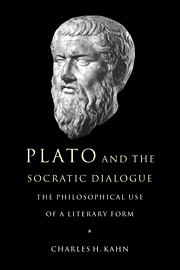Book contents
- Frontmatter
- Contents
- Preface
- List of abbreviations
- 1 Sōkratikoi logoi: the literary and intellectual background of Plato's work
- 2 The interpretation of Plato
- 3 Socrates
- 4 Plato as a minor Socratic: Ion and Hippias Minor
- 5 Gorgias: Plato's manifesto for philosophy
- 6 The priority of definition: from Laches to Meno
- 7 Charmides and the search for beneficial knowledge
- 8 Protagoras: virtue as knowledge
- 9 The object of love
- 10 The emergence of dialectic
- 11 The presentation of the Forms
- 12 Phaedrus and the limits of writing
- Appendix On Xenophon's use of Platonic texts
- Bibliography
- Indexes
10 - The emergence of dialectic
Published online by Cambridge University Press: 02 November 2009
- Frontmatter
- Contents
- Preface
- List of abbreviations
- 1 Sōkratikoi logoi: the literary and intellectual background of Plato's work
- 2 The interpretation of Plato
- 3 Socrates
- 4 Plato as a minor Socratic: Ion and Hippias Minor
- 5 Gorgias: Plato's manifesto for philosophy
- 6 The priority of definition: from Laches to Meno
- 7 Charmides and the search for beneficial knowledge
- 8 Protagoras: virtue as knowledge
- 9 The object of love
- 10 The emergence of dialectic
- 11 The presentation of the Forms
- 12 Phaedrus and the limits of writing
- Appendix On Xenophon's use of Platonic texts
- Bibliography
- Indexes
Summary
TRANSITION TO DIALECTIC AND THE FORMS
At this point our study undergoes a change of pace as well as a change in theme. Instead of moral psychology and the theory of virtue we turn now to the more technical heartland of Platonic philosophy: the concept of dialectic and the theory of Forms. This means moving also from the threshold dialogues to the Phaedo and Republic. It is Plato's own argument that has led us in this direction. In the last three chapters we have been following a line of thought that connects the beneficial knowledge of good and evil (as introduced in the Laches and Charmides) with the twin Socratic paradoxes familiar from the Gorgias, Protagoras, and Meno: that no one does evil voluntarily and that the moral virtues are somehow unified in wisdom or knowledge. But the problem remains: how can knowledge of the good guarantee right action? I have argued that Plato's conception of erōs, as a passionate desire for the good-and-beautiful, is the essential key to a Platonic understanding of these paradoxes. No one does evil willingly because our most fundamental passion is a desire for the good, a desire understood transparently or de re as a desire for what is truly good, and not merely a pursuit of what we happen to think is good. (This distinction is explicitly drawn by Plato in Rep. vi, 505D 5–9.) If we in fact pursue a goal or activity which is not really good, that can only be out of ignorance.
The task of philosophy, then, is to lead us to knowledge of the good.
- Type
- Chapter
- Information
- Plato and the Socratic DialogueThe Philosophical Use of a Literary Form, pp. 292 - 328Publisher: Cambridge University PressPrint publication year: 1997



